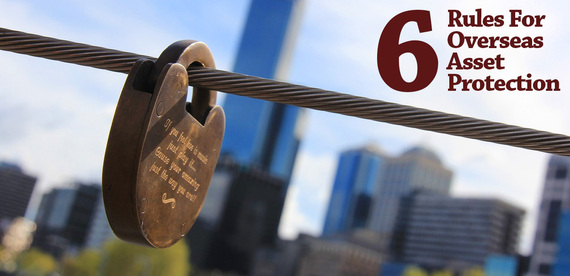Six Rules For The Offshore And Real Estate Beginner
Years ago, a friend of mine-a smart guy...a guy who'd been around the block...done business all over the world-engaged an attorney to help him structure his holdings to mitigate his global tax liability.
My friend spent more than US$100,000...didn't understand the structures he ended up with...didn't want to ask more questions, because they led to more answers he didn't understand and more billable hours...and, then, a few years later, found he was in violation of some French tax code he'd never heard of. Certainly, he didn't mean to run afoul of the French tax authorities. And, even when presented with the facts, he didn't understand exactly what he'd done that he shouldn't have done.
In the end, he had no choice but to pay the resulting US$50,000 fine...and, then, to hope no further surprises awaited him down the line.
I joke now and then about how mind-numbingly complicated, as I like to say, this international tax and structure stuff can be.
It is. And it doesn't have to be.
At first, when you're starting out, making your first foreign real estate purchase or setting up your first offshore corporation, it's intimidating. You don't know what you don't know. You fear you'll end up like my friend, breaking some tax law you didn't know existed.
I've been lucky on this front. I married an accountant, who, since we've been living outside the States, has made it his business to understand the ins and outs of U.S. tax code as it relates to the non-resident American. Lief can quote IRS rules, regs, form numbers, and exemptions by heart.
And he's taken the time to research and to understand the relevant tax issues in every jurisdiction where we've invested money, done business, or held an asset.
I'm not sure he enjoys the side-line, but, when we left the States, my husband Lief felt he had no choice. It was either figure it out himself or pay some "expert" tens of thousands of dollars to figure it out for us.
Lief's investment of time and energy has paid off, not only because it has saved us considerable money over the past decade...but also because it means we understand (well, at least he does) how we're structured. He's made all the decisions and choices himself. And we've erred on the side of disclosing and reporting even when we're not certain it's required...and paying the tax even when we're not sure it's due.
This way, we sleep better.
And, even within the context of our ultra-conservative approach, Lief has been able to control our overall tax burden. Using the foreign-earned income exemption and other straightforward exclusions, exemptions, and deductions, our overall net effective rate of tax is considerably less than it would be if we were full-time U.S. residents.
I have, though, learned a few things myself that I hope can help. Here you go:
Six things I wish someone had told me before I bought my first piece of foreign property or opened my first offshore company
Maybe you don't need to do anything. Asset protection isn't an issue until you've got assets enough to warrant the investment of time and money to figure out how to protect them. In some jurisdictions, yes, you're wise to hold property in a local or an offshore corporation...but not all. Before you do anything, make sure you understand why you're doing it and the real benefit.
Whatever you do, it shouldn't cost you tens and tens of thousands of dollars. OK, maybe if you're Bill Gates or Warren Buffet, a big investment in managing your tax and asset issues is warranted. For you and me, it's not.
The foreign-earned income exclusion may be the beginning and the end of the tax planning you require. Today, as a non-resident American, your first US$97,600 in earned income is tax free in the States, which means that, if you earn less than that your annual tax bill to Uncle Sam could be exactly zero. If you're married, you and your spouse can collectively earn US$195,200, again tax free.
When it comes to purchasing and holding real estate overseas, remember these two things: First, the jurisdiction is the key; second, as a result, no attorney in your home country is going to be able to help you figure out what to do. You need a local attorney, experienced at working with foreign buyers, to help you determine how to purchase and how to hold (in a local corporation, in a foreign corporation, in your own name, in a trust, etc.).
When it comes to dealing with the tax issues in any new jurisdiction where you take up residence, the key is to research, plan, and take action before taking up residence. Certain options for mitigating your local tax bill can be taken off the table once you've taken a local address. Again, you need local legal advice.
You can avoid any local tax issues by being only part-time resident. The particulars differ jurisdiction to jurisdiction, but, generally, spend fewer than six months in a place, and you can't be considered full-time resident for tax purposes. There are exceptions, so, again, get advice.
Original Feature: 6 Rules - Offshore Assets And Property Protection
Related Articles:
Earlier on Huff/Post50:





